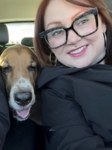
Regina has a strong network of family, friends and pets, including her mother, her boyfriend and his father, 17 nieces and nephews, Herbert George, her beloved basset hound and three cats Alfalfa James, Stella Ann and Ethel Mae. When, at age 39, she was diagnosed with cervical cancer, Regina turned to her loved ones for support.
“I remember the whole day it was raining.” When her doctor called to tell Regina her results, “all I could think about was calling my mom,” she said. “For a couple of days, I didn’t tell anybody except her.”
As a service coordinator for an organization that helps people with brain injury, Regina is familiar with helping others through health challenges. She also has lupus and other autoimmune disorders. Recalling her doctors' lack of coordination and communication with each other also added to her stress, as she felt like she was responsible for her own care. “It took about two months to figure out a treatment plan, which was stressful because I thought, ‘We need to get going.’ My mental health was not good during that time.” Eventually, though, Regina underwent a radical hysterectomy and completed radiation therapy a few months later.
For anyone who has been diagnosed with cancer, she emphasized the importance of connecting with the people who will be there. “You need to get your village together,” she said. “I had a few friends checking in on me every day and who drove to see me. You need that support.”
Regina found plenty of it from her loved ones. Her boyfriend’s father drove her to all her appointments. She also echoed advice that was given to her by a friend who had had cancer: when you go to your first oncologist appointment, “try not to go alone.” Ask all the questions you have – “there are no stupid questions,” she added. “You have to advocate for yourself. If you have a question, ask it. I wasn’t able to take in much information on my first visit. I’m glad my boyfriend was there and he wrote it all down. I have a medical journal and I write everything down because there is just so much they throw at you.”
Following complications from her hysterectomy, Regina has leaned on one of her favorite hobbies. “I read 111 books last year. You need to find that outlet when you get so overwhelmed that you can just escape for a little while.”
As she continues to heal, Regina celebrates the victories, big or small. “It sucks and some days seem unbearable, but hopefully, you’ll get through it. I try to find the good, even in the littlest things, like ‘wow, I was able to take a shower today,’ because sometimes even showering seems impossible and I’m done with my cancer treatment.”
Though she did not initially find support for others her age dealing with cervical cancer, Regina later connected with CancerCare through support groups and community programs. “I really didn’t know where to turn at first. I didn’t find any young people with cervical cancer who were my age,” she shared. “I’m thankful for CancerCare because I think everybody’s story needs to be told. I thought I was alone and that nobody else went through this.”
